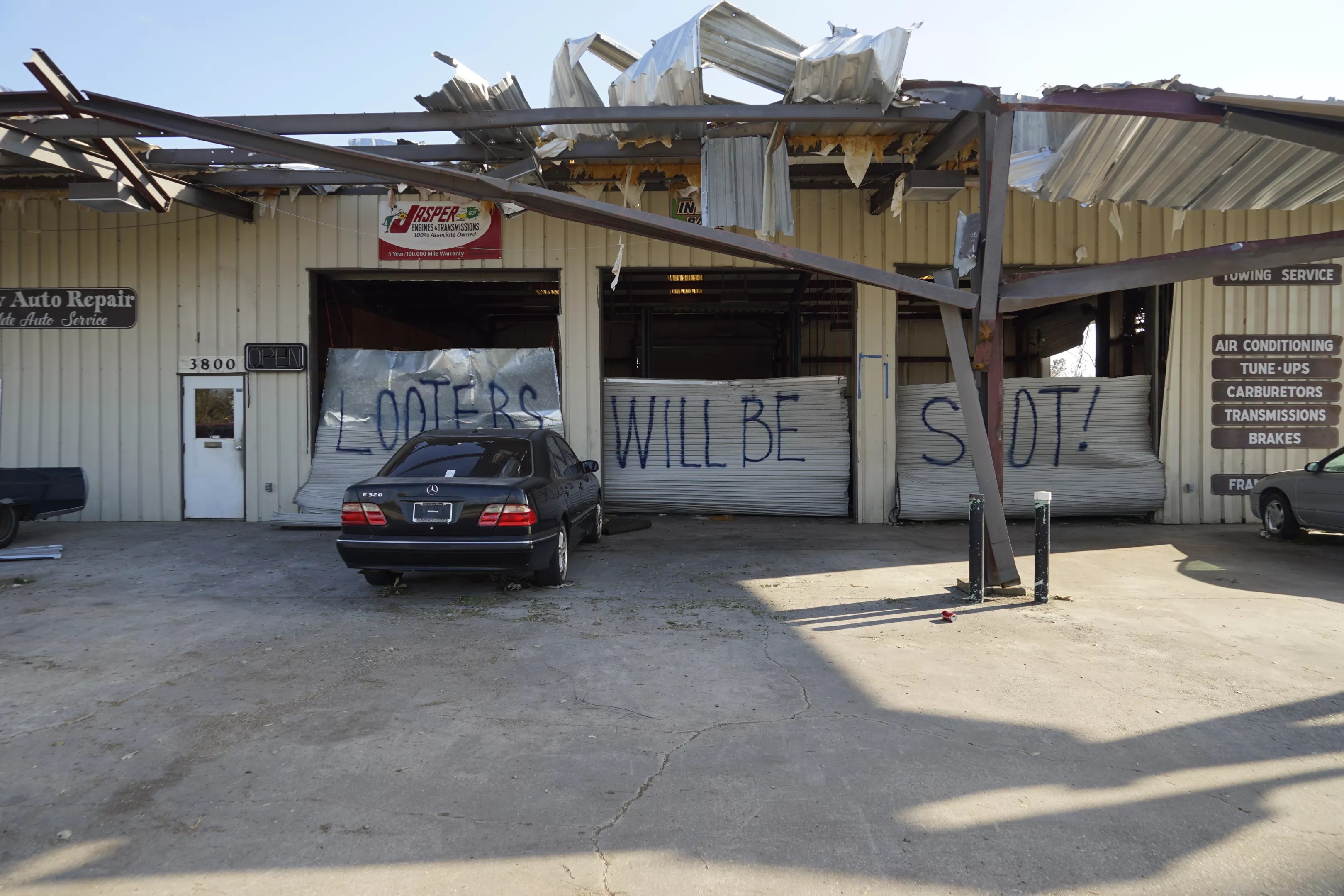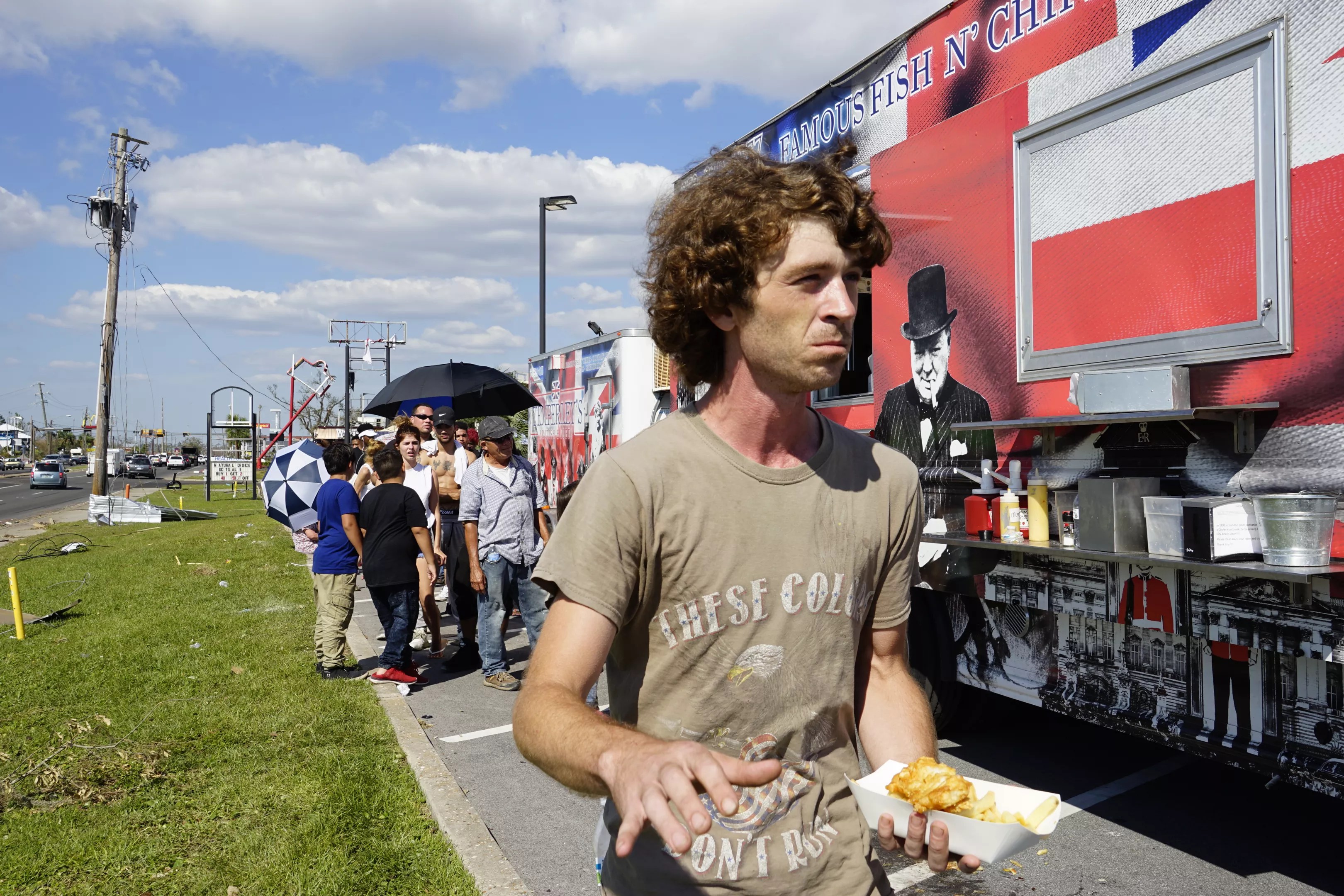
Mario Ariza

Audio By Carbonatix
Hurricane Michael ripped a hole in the roof of Amy Bauer’s tiny apartment in Springfield, a poor Panama City neighborhood. An administrative assistant in her early 50s who gets paid by the hour, she met the storm with no cash on hand, no extra food, no batteries, no flashlights.
“I didn’t have the means to prepare,” she says. “All I got was dog food and water… They don’t care about us.”
Little discussed in the aftermath of Michael is the soaring poverty rate in Panama City and the suffering of its residents following the Category 4 storm’s landfall. Much attention has been focused on the ten to 15 feet of high storm surge that all but obliterated the sleepy resort town of Mexico Beach, but the storm also battered eastern portions of Panama City, which happen to be some of its poorest. “They got the direct hit of the eye wall, and they got the stronger wind coming off of the water,” meteorologist Bryan Norcross explains.
Panama City’s poverty is extraordinarily high and rose by almost 18 percent in just four years. About one in five residents lives below the poverty line, according to U.S. Census data.

Public order in Panama City has taken a hit in the wake of Hurricane Michael. A damaged mechanic’s shop in the Springfield neighborhood bears a grim and familiar warning.
Mario Ariza
In the city’s working-class, eastern sections, relief efforts have been undertaken mostly by neighbors, churches, and volunteers. The power is still out. Cellular reception is spotty. Lines for hot food served at roadside stands set up by charities and volunteers dot the main streets, and the lines for meals stretch far back into still-flooded strip-mall parking lots. Folks accustomed to living paycheck-to-paycheck find themselves surviving hand-to-mouth. “We’re the lowest of the low,” Bauer says.
Michelle and Kenny Richardson, friends of Bauer’s who live nearby, have dropped by to deliver whatever supplies they can spare. But they’re not in a position to give much — the storm caused their home’s roof to collapse too.
Jonathan Williams, age 33, is a resident of Callaway. This past Sunday, he was waiting in line under the hot sun for hours in hopes of finding meals from a fish ‘n’ chips food truck that was donating food. “This is the worst disaster I’ve ever been to. I went to Biloxi after Katrina, and it was bad,” he says, “but this is on another level.”
Williams takes care of four kids and his 80-year-old grandfather. “That’s why I’m standing in this line,” he explains. “They need to get fed.” But when he reaches the food truck’s window, there’s disappointing news: It’s one plate per body, nothing more. Those who don’t make the line — or can’t — don’t get fed.

Amy Bauer’s home in Springfield, Panama City. Bauer weathered the storm with only water and dog food for her seven pups.
Mario Ariza
Bay County, of which Panama City is the seat, has been coordinating its storm response from an emergency operations center located on Gulf Coast State College’s North Bay Campus, some 15 miles from the storm-rocked areas in the east. But communication challenges have plagued the response and recovery efforts. Bay County Public Information Officer Katy Feeney admits the recovery effort — especially in lowest-income and hardest-hit neighborhoods — is something county officials can’t do on their own: “We’re gonna need resources; we’re gonna need assistance.”
Gulf Power, the electric utility, hopes to have service restored to the area by October 24, but Tyndall Air Force Base, the city’s largest employer, was heavily damaged and will take longer to come back online. The small and medium-size businesses that employed many of the parishioners of St. Dominic, the local Catholic church, will take longer to come back. Some might not return at all. That worries Father Michael Nixon, this flock’s young, energetic leader. “There’s not a lot of industry in this area,” he explains. “It’s definitely a community that’s on the edge financially.”

After waiting in line in the hot sun for a meal for himself and his family back home, Jonathan Williams, of Calloway, walks away with only a single serving.
Atena Sherry
Though his own rectory is unlivable and his parish center’s roof was wrecked by high winds, Nixon has turned his church parking lot into a drive-thru aid station. Families can pick up food, toiletries, and diapers — all without exiting their vehicles. One desperate woman even got a free jerry can of gas. Unfortunately, many people are still stuck in their homes by the thousands of toppled trees, Nixon says. He’s coordinating with volunteers to try to get them aid.
For Michelle and Kenny Richardson, the now-homeless couple who helped Amy Bauer, difficult questions lie ahead. “You say ‘Springfield,’ and people think you say ‘poverty,’” they explain of their neighborhood. “But both of us had steady jobs. We were doing all right.” Now neither of them knows when they’ll get a paycheck. They rode out the storm at Michelle’s place of employment — a motel — but it was shattered by the high wind, and they barely escaped being hit by debris. Kenny worked at a used-car lot. “My job is gone,” he explains. “Nobody is prepared for this, the total destruction of their lives.”
Donations for Hurricane Michael disaster relief can be made to the United Way at unitedway.org/hurricanemichael